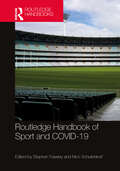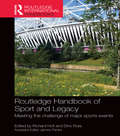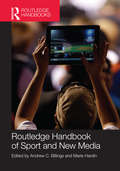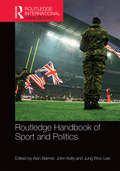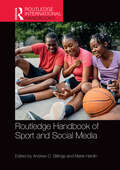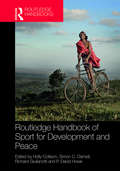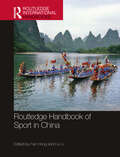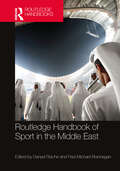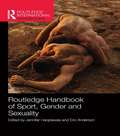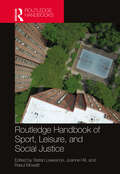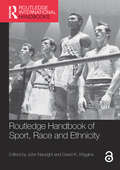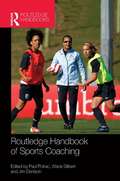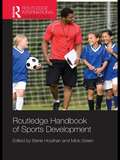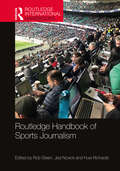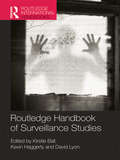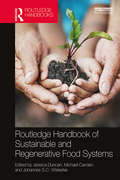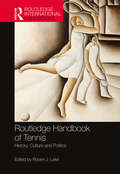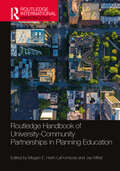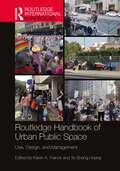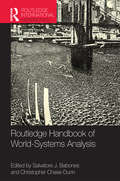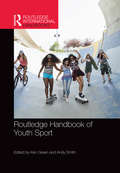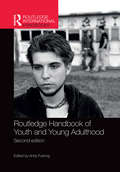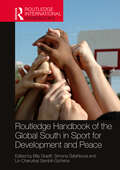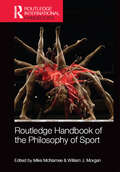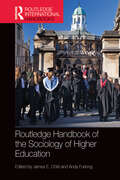- Table View
- List View
Routledge Handbook of Sport and COVID-19 (Routledge International Handbooks)
by Stephen Frawley and Nico SchulenkorfThis book examines the initial impact of the coronavirus pandemic on global sport and the varying consequences of the sport shutdown on all levels of society. It also considers the many lessons that have been learnt so that sport stakeholders can successfully adjust and operate under the "new normal." Featuring authors, cases and examples from around the world, the book explores the impact of COVID-19 on sport at all levels, from community sport – where local clubs, gyms and development programmes had to find ways to survive with pitches closed and projects cancelled – to the major professional sport leagues and sport mega-events, with events postponed and teams playing in empty stadia. It considers the economic, social and developmental impacts of the pandemic, including physical, mental and social wellbeing, and looks at how key professional and community sport organizations have reacted to the crisis, reflecting on the lessons learnt and preparations for future pandemics and challenges of similar size and significance. With COVID-19 now endemic in the global population, this is an essential reference for anybody working in sport, from students and researchers to managers, policymakers and development officers.
Routledge Handbook of Sport and Legacy: Meeting the Challenge of Major Sports Events (Routledge International Handbooks)
by Dino Ruta Richard HoltWhat remains of a great sporting spectacle after the last race is run or the final match is played? How can the vast expense of mounting such events be justified? What if there is nothing left behind or what if the legacy is negative, a costly infrastructure which is unused or a debt-ridden host city? The Routledge Handbook of Sport and Legacy addresses perhaps the most important issue in the hosting of major contemporary sporting events: the problem of ‘legacy’. It offers a rigorous, innovative and comparative insight into this contested concept from interdisciplinary and practical perspectives. Major events must now have a conscious, credible and defined policy for legacy to meet public expectations. The book provides a comprehensive survey of the various kinds of legacy that can be delivered, as well as a close examination of the potential benefits and practical challenges involved in each. From ‘hard’ legacies, such as stadia and infrastructure, to ‘soft’ legacies including skill development, attitude change and capacity building, the book offers both a historical case study and an innovative strategic management approach, and establishes the limits of what can realistically be achieved in terms of economic, social, cultural, physical and sporting development. The Routledge Handbook of Sport and Legacy includes contributions from world leading scholars and practitioners and features detailed case studies of major sports events from around the world, including the FIFA World Cup and ten Olympics Games from London in 1908 to London 2012. It is invaluable reading for students and researchers working in sport studies, events management, human geography, economics or planning, and an essential reference for any professional engaged in delivering legacy through sport.
Routledge Handbook of Sport and New Media: Routledge Handbook Of Sport And New Media (Routledge International Handbooks)
by Andrew C. Billings Marie Hardin Natalie A. BrownNew media technologies have become a central part of the sports media landscape. Sports fans use new media to watch games, discuss sports transactions, form fan-based communities, and secure minutiae about their favorite players and teams. Never before have fans known so much about athletes, whether that happens via Twitter feeds, fan sites, or blogs, and never before have the lines between producer, consumer, enactor, fan and athlete been more blurred. The Internet has made virtually everything available for sports media consumption; it has also made understanding sports media substantially more complex. The Routledge Handbook of Sport and New Media is the most comprehensive and in-depth study of the impact of new media in sport ever to be published. Adopting a broad, interdisciplinary approach, the book explores new media in sport as a cultural, social, commercial, economic, and technological phenomenon, examining the profound impact of digital technologies on that the way that sport is produced, consumed and understood. There is no aspect of social life or commercial activity in general that is not being radically influenced by the rise of new media forms, and by offering a "state of the field" survey of work in this area, the Routledge Handbook of Sport and New Media is important reading for any advanced student, researcher or practitioner with an interest in sports studies, media studies or communication studies.
Routledge Handbook of Sport and Politics (Routledge International Handbooks)
by John Kelly Alan Bairner Jung Woo LeeSport is frequently considered to be an aspect of popular culture that is, or should be, untainted by the political. However, there is a broad consensus among academics that sport is often at the heart of the political and the political is often central to sport. From the 1936 Olympic Games in Nazi Germany to the civil unrest that preceded the 2014 World Cup in Brazil, sport and politics have remained symbiotic bedfellows. The Routledge Handbook of Sport and Politics goes further than any other book in surveying the complex, embedded relationships between sport and politics. With sections addressing ideologies, nation and statehood, corporate politics, political activism, social justice, and the politics of sports events, it introduces the conceptual foundations that underpin our understanding of the sport-politics nexus and examines emergent issues in this field of study. Including in-depth case studies from North America, South America, Europe, the Middle East, Africa and Asia, this is an essential reference for anybody with an interest in the social scientific study of sport.
Routledge Handbook of Sport and Social Media (Routledge International Handbooks)
by Andrew C. Billings Marie HardinThis handbook takes an in-depth look at the transformative impact of social media on sport. With broader and deeper coverage than any previous book on this topic, the handbook explores how sports media is co-created and curated, collectively, at the individual, group and organisational level, and considers the implications for the ways in which sports media, through social media, infiltrates our lives and influences local and global culture. Exploring key concepts and presenting original case studies, the book features work by world-leading international sports media scholars. It discusses the theoretical lenses through which we can understand social media and sport, from political economy and cultural dynamics to business and management, and explains the significance of global social media platforms. The book then presents a multi-level exploration of sport and social media, including social media use by fans, athletes, teams, leagues and media organisations. Offering important new insight into a technology that now sits at the centre of our social and economic lives, this book is important reading for any researcher, student, practitioner or policymaker with an interest in sport media, sport business, sport cultures, digital media technologies, digital business, or the broader relationships between sport, media and wider society.
Routledge Handbook of Sport for Development and Peace (Routledge Studies in Sport Development)
by Richard Giulianotti Holly Collison Simon C. Darnell P. David HoweSport and physical activity are now regularly used to promote social and economic development, peacebuilding and conflict resolution, on an international scale. The emergence of the ‘Sport for Development and Peace’ (SDP) sector, comprised of governments, NGOs, sport organizations and others, reveals a high level of institutionalization of this activity, while SDP now constitutes an important element of the scholarly analysis of sport. This volume analyses and critically discusses the central elements of, and research issues within, the field of SDP and also provides a series of case studies (substantive and geographic) of key research. It is the most holistic and far-reaching text published on this topic to date. Featuring multidisciplinary perspectives from world-leading researchers and practitioners from around the world, the book covers a wide range of topics, including SDP structures, policies and funding streams, how SDP relates to human rights, social exclusion and corporate social responsibility, SDP and gender, SDP and disability, SDP and health, SDP and homelessness, and SDP and the environment. The Handbook of Sport for Development and Peace is a vital resource for researchers, students and educators in the fields of sports studies, physical education, sport for development and peace, sport-based youth development, sport and politics, sociology of sport, and sport policy.
Routledge Handbook of Sport in China (Routledge International Handbooks)
by Fan Hong Liu LiThis is the first book to offer a comprehensive overview of the history and development of sport from the ancient to the contemporary era in China. It addresses the gap between the vibrant academic scholarship within China and the limited understanding of Chinese sport outside of the country. It opens different perspectives on Chinese sport and addresses a wide range of issues central to the development of sport in the context of Chinese culture, politics, economy, and society. It explores a diverse set of topics including the history of Chinese traditional sport, the rise of modern sport and the Olympic movement, sport and nationhood, sport and politics and international relations, sport and physical education, sport and economy and commerce, sport and social stratification and diversity, and sport leisure and tourism. It offers critical insights into the multifaceted world of China, past and present—a contribution to our collective knowledge and understanding of Chinese sport and society—and is useful reading for students, researchers, and professionals with an interest in the field of China and Chinese sport. This Handbook has been contributed to by a team consisting of 88 leading Chinese and Asian experts and scholars with varied backgrounds of studying and working in European, North American, and Australian universities, as well as Western scholars with expertise on China and its sports system and practice. It is composed of ten parts classified by different subjects. It provides a wide lens through which to better contextualise the relationships between China and the world within the global sport community. The Routledge Handbook of Sport in China is a vital resource for students and scholars studying the history, politics, sociology, culture and policy of sport in China, as well as sport management, sport history, sport sociology, and sport policy and politics. It is also valuable reading for those who are working in international sport policy making and sport organisations.
Routledge Handbook of Sport in the Middle East
by Danyel ReicheThis Handbook provides a succinct overview of sport in the Middle East, drawing in scholars from a wide variety of geographical and disciplinary backgrounds (history, politics, sociology, economics and regional studies), with different methodological approaches, to create the ‘go-to’ text on the subject. After the introduction, 33 chapters from leading subject experts cover areas including history, politics, society, economy and nationhood. The authors help shed light on how certain Middle Eastern countries have become increasingly active in international sports, and the efforts made to positioning themselves as the new global ‘sports hubs’. Split into five sections, the book offers a multi-disciplinary analysis of a diverse range of sports across the geographic Middle East, including football, mixed martial arts, rugby, athletics and cycling. The authors highlight and respond to issues such as the naturalisation of athletes, female athleticism, sports media and supporter cultures. The Routledge Handbook of Sport in the Middle East stands apart from previous research through offering first-hand accounts of sport in the area from authors who live and work in the region or have a history of regularly visiting and conducting research in the region. It will be of interest to academics and students alike, in the fields of Middle East politics, sport, sport in the Middle East, international relations, governance and sociology.
Routledge Handbook of Sport, Gender and Sexuality: Routledge Handbook Of Sport, Gender And Sexuality (Routledge International Handbooks)
by Eric Anderson Jennifer HargreavesThe Routledge Handbook of Sport, Gender and Sexuality brings together important new work from 68 leading international scholars that, collectively, demonstrates the intrinsic interconnectedness of sport, gender and sexuality. It introduces what is, in essence, a sophisticated sub-area of sport sociology, covering the field comprehensively, as well as signalling ideas for future research and analysis. Wide-ranging across different historical periods, different sports, and different local and global contexts, the book incorporates personal, ideological and political narratives; varied conceptual, methodological and theoretical approaches; and examples of complexities and nuanced ways of understanding the gendered and sexualized dynamics of sport. It examines structural and cultural forms of gender segregation, homophobia, heteronormativity and transphobia, as well as the ideological struggles and changes that have led to nuanced ways of thinking about the sport, gender and sexuality nexus. This is a landmark work of reference that will be a key resource for students and researchers working in sport studies, gender studies, sexuality studies or sociology.
Routledge Handbook of Sport, Leisure, and Social Justice (Routledge Critical Perspectives on Equality and Social Justice in Sport and Leisure)
by Stefan Lawrence Joanne Hill Rasul MowattThis is the first book to explore in breadth and in depth the complex intersections between sport, leisure, and social justice.This book examines the relations of power that produce social inequalities and considers how sport and leisure spaces can perpetuate those relations, or act as sites of resistance, and makes a powerful call for an activist scholarship in sport and leisure studies. Presenting original theoretical and empirical work by leading international researchers and practitioners in sport and leisure, this book addresses the central social issues that lie at the heart of critical social science – including racism, sexism, homophobia, transphobia, ableism, religious persecution, socio-economic deprivation, and the climate crisis – and asks how these issues are expressed or mediated in the context of sport and leisure practices. Covering an incredibly diverse range of topics and cases – including sex testing in sport; sport for refugees; pedagogical practices in physical education; community sport development; events and human rights; and athlete activism – this book also surveys the history of sport and social justice research, as well as outlining theoretical and methodological foundations for this field of enquiry.The Routledge Handbook of Sport, Leisure and Social Justice is an indispensable resource for any advanced student, researcher, policymaker, practitioner, or activist with an interest in the sociology, culture, politics, history, development, governance, media and marketing, and business and management of sport and leisure.
Routledge Handbook of Sport, Race and Ethnicity (Routledge International Handbooks)
by John Nauright David K WigginsFew issues have engaged sports scholars more than those of race and ethnicity. Today, globalization and migration mean all major sports leagues include players from around the globe, bringing into play a complex mix of racial, ethnic, cultural, political and geographical factors. These complexities have been examined from many angles by historians, sociologists, anthropologists and scientists. This is the first book to offer a comprehensive survey of the full sweep of approaches to the study of sport, race and ethnicity. The Routledge Handbook of Sport, Race and Ethnicity makes a substantial contribution to scholarship, presenting a collection of international case studies that map the most important developments in the field. Multi-disciplinary in its approach, it engages with a wide range of disciplines including history, politics, sociology, philosophy, science and gender studies. It draws upon the latest cutting-edge research to address key issues such as racism, integration, globalisation, development and management. Written by a world-class team of sports scholars, this book is essential reading for all students, researchers and policy-makers with an interest in sports studies.
Routledge Handbook of Sports Coaching (Routledge International Handbooks)
by Paul Potrac Jim Denison Wade GilbertOver the last three decades sports coaching has evolved from a set of customary practices based largely on tradition and routine into a sophisticated, reflective and multi-disciplinary profession. In parallel with this, coach education and coaching studies within higher education have developed into a coherent and substantial field of scholarly enquiry with a rich and sophisticated research literature. The Routledge Handbook of Sports Coaching is the first book to survey the full depth and breadth of contemporary coaching studies, mapping the existing disciplinary territory and opening up important new areas of research. Bringing together many of the world’s leading coaching scholars and practitioners working across the full range of psychological, social and pedagogical perspectives, the book helps to develop an understanding of sports coaching that reflects its complex, dynamic and messy reality. With more importance than ever before being attached to the role of the coach in developing and shaping the sporting experience for participants at all levels of sport, this book makes an important contribution to the professionalization of coaching and the development of coaching theory. It is important reading for all students, researchers and policy makers with an interest in this young and flourishing area.
Routledge Handbook of Sports Development (Routledge International Handbooks)
by Barrie Houlihan Mick GreenSports development has become a prominent concern within both the academic study of sport and within the organisation and administration of sport. Now available in paperback, the Routledge Handbook of Sports Development is the first book to comprehensively map the wide-ranging territory of sports development as an activity and as a policy field, and to offer a definitive survey of current academic knowledge and professional practice. Spanning the whole spectrum of activity in sports development, from youth sport and mass participation to the development of elite athletes, the book identifies and defines the core functions of sports development, exploring the interface between sports development and cognate fields such as education, coaching, community welfare and policy. The book presents important new studies of sports development around the world, illustrating the breadth of practice within and between countries, and examines the most important issues facing practitioners within sports development today, from child protection to partnership working. With unparalleled depth and breadth of coverage, the Routledge Handbook of Sports Development is the definitive guide to policy, practice and research in sports development. It is essential reading for all students, researchers and professionals with an interest in this important and rapidly evolving discipline.
Routledge Handbook of Sports Journalism (Routledge International Handbooks)
by Huw Richards Rob Steen Jed NovickThe Routledge Handbook of Sports Journalism is a comprehensive and in-depth survey of the fast-moving and multifaceted world of sports journalism. Encompassing historical and contemporary analysis, and case studies exploring best practice as well as cutting edge themes and issues, the book also represents an impassioned defence of the skill and art of the trained journalist in an era of unmediated digital commentary. With contributions from leading sports-media scholars and practising journalists, the book examines journalism across print, broadcast and digital media, exploring the everyday reality of working as a contemporary reporter, editor or sub-editor. It considers the organisations that shape output, from PR departments to press agencies, as well as the socio-political themes that influence both content and process, such as identity, race and gender. The book also includes interviews with, and biographies of, well-known journalists, as well as case studies looking at the way that some of the biggest names in world sport, from Lance Armstrong to Caster Semenya, have been reported. This is essential reading for all students, researchers and professionals working in sports journalism, sports broadcasting, sports marketing and management, or the sociology or history of sport.
Routledge Handbook of Surveillance Studies (Routledge International Handbooks)
by David Lyon Kevin D. Haggerty Kirstie BallSurveillance is a central organizing practice. Gathering personal data and processing them in searchable databases drives administrative efficiency but also raises questions about security, governance, civil liberties and privacy. Surveillance is both globalized in cooperative schemes, such as sharing biometric data, and localized in the daily minutiae of social life. This innovative Handbook explores the empirical, theoretical and ethical issues around surveillance and its use in daily life. With a collection of over forty essays from the leading names in surveillance studies, the Handbook takes a truly multi-disciplinary approach to critically question issues of: surveillance and population control policing, intelligence and war production and consumption new media security identification regulation and resistance. The Routledge Handbook of Surveillance Studies is an international, accessible, definitive and comprehensive overview of the rapidly growing multi-disciplinary field of surveillance studies. The Handbook’s direct, authoritative style will appeal to a wide range of scholars and students in the social sciences, arts and humanities.
Routledge Handbook of Sustainable and Regenerative Food Systems
by Jessica DuncanThis handbook includes contributions from established and emerging scholars from around the world and draws on multiple approaches and subjects to explore the socio-economic, cultural, ecological, institutional, legal, and policy aspects of regenerative food practices. The future of food is uncertain. We are facing an overwhelming number of interconnected and complex challenges related to the ways we grow, distribute, access, eat, and dispose of food. Yet, there are stories of hope and opportunities for radical change towards food systems that enhance the ability of living things to co-evolve. Given this, activities and imaginaries looking to improve, rather than just sustain, communities and ecosystems are needed, as are fresh perspectives and new terminology. The Routledge Handbook of Sustainable and Regenerative Food Systems addresses this need. The chapters cover diverse practices, geographies, scales, and entry-points. They focus not only on the core requirements to deliver sustainable agriculture and food supply, but go beyond this to think about how these can also actively participate with social-ecological systems. The book is presented in an accessible way, with reflection questions meant to spark discussion and debate on how to transition to safe, just, and healthy food systems. Taken together, the chapters in this handbook highlight the consequences of current food practices and showcase the multiple ways that people are doing food differently. The Routledge Handbook of Sustainable and Regenerative Food Systems is essential reading for students and scholars interested in food systems, governance and practices, agroecology, rural sociology, and socio-environmental studies.
Routledge Handbook of Tennis: History, Culture and Politics (Routledge International Handbooks)
by Robert J. LakeTennis is one of the world’s most popular sports, as levels of participation and spectatorship demonstrate. Moreover, tennis has always been one of the world’s most significant sports, expressing crucial fractures of social class, gender, sexuality, race and ethnicity - both on and off court. This is the first book to undertake a survey of the historical and socio-cultural sweep of tennis, exploring key themes from governance, development and social inclusion to national identity and the role of the media. It is presented in three parts: historical developments; culture and representations; and politics and social issues, and features contributions by leading tennis scholars from North America, Europe, Asia and Australia. The most authoritative book published to date on the history, culture and politics of tennis, this is an essential reference for any course or program examining the history, sociology, politics or culture of sport.
Routledge Handbook of University-Community Partnerships in Planning Education (Routledge International Handbooks)
by Heim LaFrombois, Megan E. Jay MittalThis handbook explores two guiding questions – how can university-community partnerships in planning education work, and how can they be transformative? University-community partnerships – often referred to as service-learning or community-engaged teaching and learning – are traditionally based on a collaborative relationship between an academic partner and a community-based partner, in which students from the academic partner work within the community on a project. Transformational approaches to university-community partnerships are approaches that develop and sustain mutually beneficial collaborations where knowledge is co-created and new ways of knowing and doing are discovered. This edited volume examines a variety of university-community partnerships in planning education, from a number of different perspectives, with a focus on transformative models. The authors explore broader theoretical issues, including topics relating to pedagogy, planning theory, and curriculum; along with more practical topics relating to best practices, logistics, institutional support, outcome measures, and the various forms these partnerships can take – all through an array of case studies. The authors, which include academics, professional practitioners, academic practitioners, and students, bring an incredible depth and breadth of knowledge and experience from across the globe – Australia, Canada, Chile, Europe (including Germany, Spain, Slovakia, and Sweden), India, Jamaica, South Korea, and the United States.
Routledge Handbook of Urban Public Space: Use, Design, and Management (Routledge International Handbooks)
by Karen A. FranckIs it truly the "end" of public space? This handbook presents evidence that the answer is "no". In cities in different parts of the world, people still use public space to pursue activities of their choice. The book is divided into seven sections. The first section presents three emerging types of public space. Each of the subsequent five sections focuses on a type of activity: recreation, commerce, protest, living and celebration. These sections are international in scope, presenting cases of activities in Brazil, China, Colombia, DR Congo, Egypt, Finland, Germany, Libya, Taiwan, Turkey and the U.S. The closing section, composed of three chapters, presents research methods for studying public space. Graduate students, faculty members and researchers in social science, architecture, landscape architecture, geography and urban design will find the book useful for understanding, studying and designing urban public space.
Routledge Handbook of World-Systems Analysis (Routledge International Handbooks)
by Christopher Chase-Dunn Salvatore J. BabonesWorld-systems analysis has developed rapidly over the past thirty years. Today's students and junior scholars come to world-systems analysis as a well-established approach spanning all of the social sciences. The best world-systems scholarship, however, is spread across multiple methodologies and more than half a dozen academic disciplines. Aiming to crystallize forty years of progress and lay the groundwork for the continued development of the field, the Handbook of World-Systems Analysis is a comprehensive review of the state of the field of world-systems analysis since its origins almost forty years ago. The Handbook includes contributions from a global, interdisciplinary group of more than eighty world-systems scholars. The authors include founders of the field, mid-career scholars, and newly emerging voices. Each one presents a snapshot of an area of world-systems analysis as it exists today and presents a vision for the future. The clear style and broad scope of the Handbook will make it essential reading for students and scholars of anthropology, archaeology, geography, political science, history, sociology, and development economics.
Routledge Handbook of Youth Sport (Routledge International Handbooks)
by Andy Smith Ken GreenThe Routledge Handbook of Youth Sport is a comprehensive survey of the latest research into young people’s involvement in sport. Drawing on a wide diversity of disciplines, including sociology, psychology, policy studies, coaching, physical education and physiology, the book examines the importance of sport during a key transitional period of our lives, from the later teenage years into the early twenties, and therefore helps us develop a better understanding of the social construction of young people’s lives. The book covers youth sport in all its forms, from competitive game-contests and conventional sport to recreational activities, exercise and lifestyle sport, and at all levels, from elite competition to leisure time activities and school physical education. It explores youth sport across the world, in developing and developed countries, and touches on some of the most significant themes and issues in contemporary sport studies, including physical activity and health, lifelong participation, talent identification and development, and safeguarding and abuse. No other book brings together in one place such a breadth and depth of material on youth sport or the engagement of young people in physical activity. The Routledge Handbook of Youth Sport is therefore important reading for all advanced students, researchers, practitioners and policy-makers with an interest in youth sport, youth culture, sport studies or physical education.
Routledge Handbook of Youth and Young Adulthood (Routledge International Handbooks)
by Andy FurlongThe second and completely revised edition of the Routledge Handbook of Youth and Young Adulthood draws on the work of leading academics from four continents in order to introduce up-to-date perspectives on a wide range of issues that affect and shape youth and young adulthood. It provides a multi-disciplinary overview of a dynamic field of study that offers unique insights on social change in advanced societies. It is aimed at researchers, policy-makers and advanced students on a global level. The Handbook introduces the main theoretical perspectives used within youth studies and sets out future research agendas. Each of the ten sections covers an important area of research – from education and the labour market to youth cultures, health and crime – discussing change and continuity in the lives of young people, introducing readers to some of the most important work in the field, while highlighting the underlying perspectives that have been used to understand the complexity of modern youth and young adulthood.
Routledge Handbook of the Global South in Sport for Development and Peace (Routledge International Handbooks)
by Billy Graeff Simona Šafaříková Sambili-Gicheha, Lin CherurbaiThis book explores the field of Sport for Development and Peace (SDP), putting Global South voices and perspectives at the centre of the analysis.Covering a wide range of thematic and methodological areas that inform existing and emerging discourses in SDP, it represents an unparalleled resource for researchers and practitioners working in this area. Arranged into geographical sections covering Africa, Asia, South America, North America and Oceania, the book presents original research in Global South countries or by Global South researchers and practitioners, sometimes in collaboration with colleagues from the Global North. It highlights practices and theories created, developed, interpreted and reinterpreted by people who belong to the communities where these sporting experiences have been taking place, and whose critical reflections and experiences have yet to gain attention in international academic and practitioner communities in the English language. The book presents the views of diverse stakeholders, programme participants, promoters, coaching staff, volunteers, researchers, teachers, lecturers and other actors that have been difficult to access for researchers who do not usually speak languages other than English.A landmark publication in the field of SDP, this book is essential reading for any advanced student, research, practitioner or policy-maker with an interest in the value of sport in international development.
Routledge Handbook of the Philosophy of Sport (Routledge International Handbooks)
by Mike McNamee William J. MorganThe Routledge Handbook of the Philosophy of Sport is a landmark publication in sport studies. It goes further than any book has before in tracing the contours of the discipline of the philosophy of sport and in surveying the core themes, approaches and theories that form its disciplinary fabric. The book explores the ways in which an understanding of philosophy can inform our understanding of important prevailing issues in sport. Edited by two of the most significant figures in the development of the philosophy of sport, Mike McNamee and Bill Morgan, and with contributions from many of the world’s leading sport philosophers, this is an invaluable companion reference volume for any course in the social scientific study of sport, and an essential addition to the bookshelf of any serious scholar of the philosophy and/or ethics of sport.
Routledge Handbook of the Sociology of Higher Education (Routledge International Handbooks)
by Andy Furlong James E. CoteThis is the first handbook to cover the sociological approaches to higher education. It is timely because of global expansions of mass higher educational systems, especially as these systems come under scrutiny by a variety of stakeholders. Questions are being raised about the value of traditional pedagogies along with calls for efficiency, accountability and cost-reduction, but above all job training. Within this neoliberal context, each chapter examines different sociological aspects of, and debates about, educational institutions as status-conferring organizations, with myriad positional characteristics, experiences, and outcomes. Many current debates concern the legitimacy of the statuses conferred, including the continuing debate regarding the role of universities in legitimating social class reproduction as well as more recent concerns about standards in mass systems. This handbook puts these issues and debates in focus in ways that will be of interest to a variety of stakeholders, within academia as well as in policy circles.
